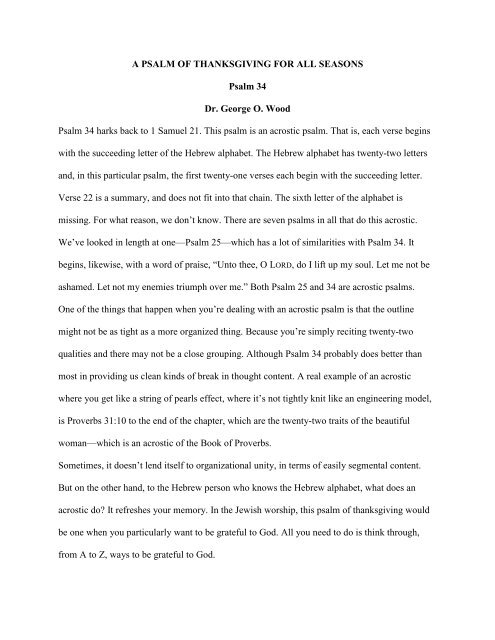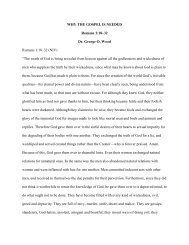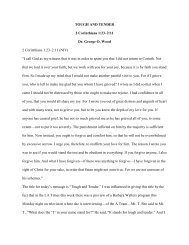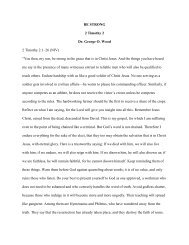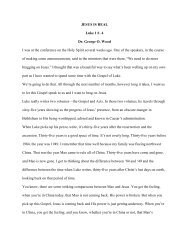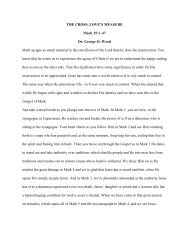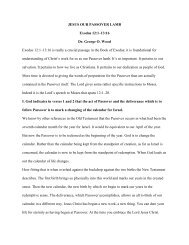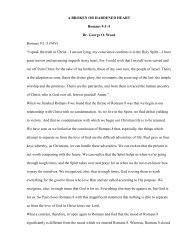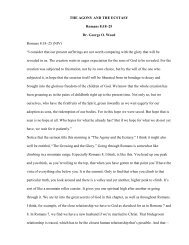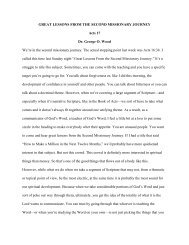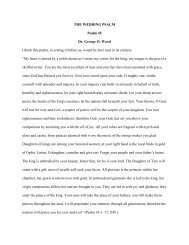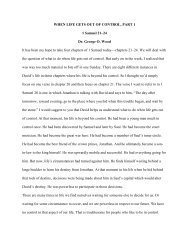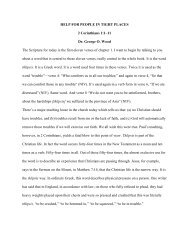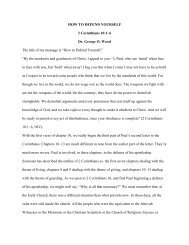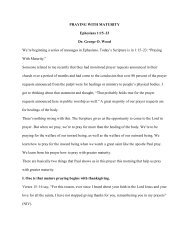27 A PSALM OF THANKSGIVING FOR ALL SEASONS.pdf
27 A PSALM OF THANKSGIVING FOR ALL SEASONS.pdf
27 A PSALM OF THANKSGIVING FOR ALL SEASONS.pdf
Create successful ePaper yourself
Turn your PDF publications into a flip-book with our unique Google optimized e-Paper software.
A <strong>PSALM</strong> <strong>OF</strong> <strong>THANKSGIVING</strong> <strong>FOR</strong> <strong>ALL</strong> <strong>SEASONS</strong>Psalm 34Dr. George O. WoodPsalm 34 harks back to 1 Samuel 21. This psalm is an acrostic psalm. That is, each verse beginswith the succeeding letter of the Hebrew alphabet. The Hebrew alphabet has twenty-two lettersand, in this particular psalm, the first twenty-one verses each begin with the succeeding letter.Verse 22 is a summary, and does not fit into that chain. The sixth letter of the alphabet ismissing. For what reason, we don‘t know. There are seven psalms in all that do this acrostic.We‘ve looked in length at one—Psalm 25—which has a lot of similarities with Psalm 34. Itbegins, likewise, with a word of praise, ―Unto thee, O LORD, do I lift up my soul. Let me not beashamed. Let not my enemies triumph over me.‖ Both Psalm 25 and 34 are acrostic psalms.One of the things that happen when you‘re dealing with an acrostic psalm is that the outlinemight not be as tight as a more organized thing. Because you‘re simply reciting twenty-twoqualities and there may not be a close grouping. Although Psalm 34 probably does better thanmost in providing us clean kinds of break in thought content. A real example of an acrosticwhere you get like a string of pearls effect, where it‘s not tightly knit like an engineering model,is Proverbs 31:10 to the end of the chapter, which are the twenty-two traits of the beautifulwoman—which is an acrostic of the Book of Proverbs.Sometimes, it doesn‘t lend itself to organizational unity, in terms of easily segmental content.But on the other hand, to the Hebrew person who knows the Hebrew alphabet, what does anacrostic do? It refreshes your memory. In the Jewish worship, this psalm of thanksgiving wouldbe one when you particularly want to be grateful to God. All you need to do is think through,from A to Z, ways to be grateful to God.
A <strong>PSALM</strong> <strong>OF</strong> <strong>THANKSGIVING</strong> <strong>FOR</strong> <strong>ALL</strong> <strong>SEASONS</strong>Psalm 34This psalm particularly, I‘ve called ―A Psalm of Thanksgiving for All Seasons.‖ It fits, whetherwe‘re in a specific situation, like David, having been delivered from a very dangerous moment inhis life. Or, as David says, ―I will bless the LORD at all times.‖ It‘s a wonderful hymn ofthanksgiving.The superscription to the psalm refers to the incident in David‘s life described in 1 Samuel 21,when he had fled down to Gath. Gath was one of the five major Philistine cities which belongedto the historic enemies of God‘s people. David had been in Saul‘s court. Saul had ultimatelyturned against him. David had met with Jonathan to privately find out if the king‘s attitudetoward him had changed. Jonathan, by overshooting the arrows, indicated that Saul was out toget him. So in the final meeting, after Jonathan dismissed his arrow-bearer, they said good bye.David fled and went to see the high priest Ahimelech, where he got the bread of the Presence andGoliath‘s sword. With the small band of men with him, he went down to Philistia, where he had―slain his tens of thousands and Saul had slain his thousands‖ (1 Samuel 18:7). When he arrivedat the gates of Gath, he realized that they would, of course, know who he was.1 Samuel 21 says he feigned insanity. He did that by making markings on the gates and lettingspittle dribble down his beard, which in the Middle Eastern world was a mark of madness orinsanity. The king didn‘t do anything to David. David went from Gath to the cave of Adullam,where he collected his army and made out of it a great fighting unit, with whom he ultimatelycame to power. He obviously could have been killed in Gath, had he not had the protection of theLord, had he not feigned madness and the king been disposed to let him go.This incident is celebrating his deliverance on that occasion. He does not tell us whenspecifically the psalm was written, but I think it was likely shortly after his deliverance, maybe2
A <strong>PSALM</strong> <strong>OF</strong> <strong>THANKSGIVING</strong> <strong>FOR</strong> <strong>ALL</strong> <strong>SEASONS</strong>Psalm 34when he got to the cave of Adullam, that he began to feel this overwhelming sense ofthanksgiving to the Lord.One technical problem needs to be cleared up. If you read 1 Samuel 21, you‘ll find that the kingis referred to, not by the name of ―Abimelech,‖ but by the name of ―Achish.‖ Abraham had anencounter with an Abimelech. Abimelech was actually the official name of the king, and the kinghas a dynastic name and a personal name. Just as the word ―Pharaoh‖ is a dynastic name and allthe scores and scores were simply called ―Pharaoh,‖ but each of them had an individual name.Abimelech is a name that means ―God is my father.‖ The dynastic name is used by the psalmistDavid in Psalm 34, and Achish is used in 1 Samuel 21.The purpose of David in writing this psalm is to praise the Lord, who had saved him out of all ofhis troubles, and to invite everybody to join with him in words of gratitude to the Lord. And, inthe process of giving gratitude to the Lord, to set forth the lesson that is to be learned: that Godhas a very special care for His own.The psalm really, in the first 10 verses, is more in the nature of testimony and in verses 11–22,the last half, it follows more the nature of ―here is the lesson to be learned…the teaching value ofmy experience.‖Let‘s look at the psalm as it easily breaks down.I. Verses 1–3: a call to magnify the Lord.―I will extol the LORD at all times; his praise will always be on my lips. My soul will boast in theLORD; let the afflicted hear and rejoice. Glorify the LORD with me; let us exalt his nametogether‖ (Psalm 34:1–3, NIV).3
A <strong>PSALM</strong> <strong>OF</strong> <strong>THANKSGIVING</strong> <strong>FOR</strong> <strong>ALL</strong> <strong>SEASONS</strong>Psalm 34David has been delivered at a very specific time in his life—at Gath, from Achish. He jumps offof that experience and makes it universal. He says, ―I‘m not only praising the Lord in this time,but I‘m praising Him at all times.‖ Or, ―In every time.‖By this, David is saying to us that there is no time in life when a praise to God should not orcannot be on our lips. This is the theme that Paul picks up in Philippians, when he says ―Rejoicein the Lord always and again I say rejoice‖ (Philippians 4:4). When he reminds us that, withprayers and supplications and thanksgivings, we‘re to continually come before the Lord.At a time when we‘re going through difficulty, our praises will center, perhaps not in the eventitself, but in the character and the greatness of the God whom we serve. ―I will extol the LORD atall times‖ (Psalm 34:1). Since all believers cannot thank God for the same thing, we have to finda deeper ground of thanksgiving than simply the good things. The deeper ground is what Davidis stating here: ―I will bless the LORD at all times.‖ That is, what is true about God when Iabound and when I‘m abased? What is always true? How can I always thank Him? The emphasisis, ―I will extol the LORD.‖ It is a decision that‘s made. The praise is not simply generatedfeelings. It‘s a decision. ―Bless the Lord at all times.‖Admittedly, there are times in our lives when it is difficult to do this.The word ―bless‖ in the English has a different meaning than it does in the Hebrew. In theEnglish it usually means ―to confer a benefit upon a person‖ or ―to praise that person.‖ But in theHebrew, the root idea comes from the word ―knee.‖ So to bless the Lord is connected with theidea of bowing the knee or bending the knee before God. One of the ways to further understandPsalm 33 is to say, ―I will bend the knee to God at all times.‖ That is, ―I will surrender to Himand I will invite God to finish the work that He‘s doing in my life at this moment, even if it isunpleasant to me. I will bend the knee to the Lord at all times. His praise will always be on my4
A <strong>PSALM</strong> <strong>OF</strong> <strong>THANKSGIVING</strong> <strong>FOR</strong> <strong>ALL</strong> <strong>SEASONS</strong>Psalm 34lips.‖ When David has praised the Lord himself, he invites everybody else to join in, becausethat‘s part of what it means to be a community of faith. We do not sing our praises to God alone.We are strengthened. We are encouraged by the praises of other people. That‘s why singingtogether is so important—praising the Lord and having testimonies together. We‘re invitingother people to join in with us and to exalt the Lord.―Glorify the LORD with me. Let us exalt his name together‖ (verse 3). Or, as the King Jamessays, ―magnify.‖ ―Make great‖ is the literal idea. ―Make great the name of the Lord.‖How do we make God great? God is already great without us giving Him any help. There is not asingle thing I can add to God. He doesn‘t need my advice. He doesn‘t need my counsel. Hedoesn‘t need me for any reason other than a need He‘s created in himself to desire fellowshipwith people who voluntarily, from their own heart, worship Him. How can I make Him greatwhen He has all the greatness He will ever need? What is the psalmist saying when he‘sencouraging us to worship? ―Make great the Lord.‖ ―Magnify the Lord.‖I think what comes out of that, what he‘s really saying is that we don‘t do anything that changesthe character or somehow enhances God himself; but what we do is make Him great in terms ofour own awareness of Him. That‘s where He needs to be made great. I think one of the thingsthat happen, when we worship together, is that, when there‘s a real sense of the vital presence ofthe Lord, He‘s being made great and it‘s easy for people to release faith. It‘s easier for spiritualgifts to flow. It‘s easier for us to just open our hearts to God and be moved—because the Lord isbeing made great in our midst.Reading this psalm has made me freshly aware that that‘s always the kind of prayer we ought tohave whenever we gather together as a body of Christ. We‘re praying that, in that service, Godwould be made great. In some people‘s lives, who gather, He‘s not present at all. In others, He‘s5
A <strong>PSALM</strong> <strong>OF</strong> <strong>THANKSGIVING</strong> <strong>FOR</strong> <strong>ALL</strong> <strong>SEASONS</strong>Psalm 34present in only a diminished kind of way. Yet it is when He is made great that the inner life getsbusted up and broken up and healed and changed before Him. ―Make great the Lord.‖When we pray that, we‘re asking that we become more aware—our perception of God increases.―Exalt his name together.‖That‘s the call to worship (verses 1–3).II. Verses 4–10 give us the second part of this psalm, which is David’s personal testimony.These seven verses give us the specifics of his escape and what he has learned from it in his ownexperience. ―I sought the LORD, and he answered me; he delivered me from all my fears‖ (Psalm34:4, NIV). What David is saying is: when we take our fears to God, they have a way ofdisappearing. He sought the Lord. It was a tough time for him. And maybe he didn‘t initiallyseek the Lord completely. Perhaps if he had sought the Lord more fully, he wouldn‘t have gottenAhimelech the high priest in trouble, which caused his death.Then he fled to Gath. I wonder if he really prayed for God‘s guidance when he went to thePhilistines. That seemed like a crazy thing to do, when he had been their enemy. But at onepoint, he finally comes to himself and he says, ―I sought the Lord. I had such fear I‘d lose mylife.‖ When we come to God in any crisis in our life, the Lord does act. If we stay in prayer andtrust Him implicitly, we‘ll come to grips with the irrationalities and the tremendous fears that wecope with in life.He goes on to say that the Lord not only delivered him from all his fears but ―Those who look tohim are radiant; their faces are never covered with shame‖ (Psalm 34:5, NIV). David‘s face hadbeen covered with shame—because he had had spittle dripping off of his beard as he feignedmadness in Gath. Now he‘s saying that, with the Lord‘s deliverance, there‘s come a whole6
A <strong>PSALM</strong> <strong>OF</strong> <strong>THANKSGIVING</strong> <strong>FOR</strong> <strong>ALL</strong> <strong>SEASONS</strong>Psalm 34change in his countenance. A radiant face. David is talking about being refreshed in the Lord‘spresence—it can show on our countenance.Paul picks up this theme in 2 Corinthians 3, when he talks about looking into the Lord‘s face andbeing transformed. ―Those who look to him are radiant, their faces are never covered withshame.‖ ―This poor man called, and the LORD heard him; he saved him out of all his troubles‖(Psalm 34:6, NIV). That‘s a process. The New English Bible translates this literally, ―Here was apoor wretch who cried to the Lord.‖For David, his deliverance was a ―this life‖ deliverance. Sometimes, it could be a ―not of thislife‖ deliverance.C. S. Lewis has a great line in reference to this verse. He said, ―Down through the ages,whenever men might need courage, they might cry out, ‗Billy Budd, help me!‘ and nothing verysignificant happens. But for nineteen hundred years, whenever men have cried out, ‗Lord Jesus,help me!‘ something has happened. This poor man cried and the Lord heard him and deliveredhim.‖Verse 7 notes God‘s special provision for His people, with protection of angels. ―The angel ofthe LORD encamps around those who fear him, and he delivers them‖ (Psalm 34:7, NIV).Nobody knows for sure what David‘s view of ―the angel of the lord‖ is. But David, in his life,only had one angelic encounter and it was a negative one—when he numbered the people. Anangel of the Lord brought a visitation of death. That‘s the only confrontation with an angel hehad had in his life. You never find him, like the prophets, having angelic visitations. He has asense that the Lord has sent special messengers to watch over him.It‘s going to be interesting when we get to heaven and find out whether we did have guardianangels. There are evangelical Christians who believe we have special angels assigned to us. The7
A <strong>PSALM</strong> <strong>OF</strong> <strong>THANKSGIVING</strong> <strong>FOR</strong> <strong>ALL</strong> <strong>SEASONS</strong>Psalm 34Lord talks about ―little children‖ (―Their angels always behold the face of My father who is inheaven,‖ Matthew 18:10). What does He mean? Some have suggested that He‘s talking in termsof the language of an eastern king who has advisors—you have to be pretty important to getclose to the king, like being a president‘s advisor. Jesus is saying that children are so importantthat they have counterpart representation in the court of the King of kings. But do we all have aguardian angel? I don‘t know if the Scriptures teach that. But the Scriptures certainly do teachthat God sends His angels to guard us and to superintend His work in us. To sometimes protectus.What the Bible is telling us is that we‘re not alone in life. We have the Holy Spirit in us. Wehave angelic beings that, in some way, watch over our life, even if they‘re invisible and we donot see them. And we have the Father in heaven, who cares for us; the Son, who intercedes forus. We have an intercessor in the heavens, an intercessor in the heart—helpers that are in theunseen spiritual world. ―The angel of the LORD encamps around those who fear him.‖ Peter inprison—the angel comes and frees him and disappears.As we go through this—―Taste and see that the LORD is good‖—there‘s an invitation toexperience. ―Blessed is the man who takes refuge in him. Fear the LORD, you, his saints, forthose who fear him lack nothing. The lions may grow weak and hungry, but those who seek theLORD lack no good thing‖ (Psalm 34:8-10, NIV).How do we understand that? I think what this means is—from God‘s perspective on our life—Hegives us what we really need. We have to then look at what we think we need and ask, is this awant or a need? Is it something that is in this external realm, rather than in the inward realm ofour life? God will not let us lack anything and, in any moment of life, when we need His specialstrength or presence, He‘ll be there to give it to us. David uses this analogy. ―The lions,‖ he says,8
A <strong>PSALM</strong> <strong>OF</strong> <strong>THANKSGIVING</strong> <strong>FOR</strong> <strong>ALL</strong> <strong>SEASONS</strong>Psalm 34―may grow weak and hungry‖ (Psalm 34:10, NIV). The young lions, from a theological point ofview, epitomized the essence of self-sufficiency in the provision for their own bodily physicalneeds. In contrast, are those who come to the Lord and are not self-sufficient. David is sayingthat the person who is self-sufficient—even the young lions—will wind up lacking. But theperson who trusts in the Lord will lack no good thing.I think he‘s speaking in an ultimate sense. Not just right now. But in an ultimate sense, when theissues of life are all resolved, the person who has depended upon their own prowess to get and togain will come up short and empty. Not the person who depends upon the Lord.That‘s his testimony. Now come some lessons.III. Verses 11–14: a brief lesson on the godly life.―Come, my children, listen to me; I will teach you the fear of the LORD [That is part of, in theOld Testament, what‘s called ―wisdom literature‖]‖ (Psalm 34:11, NIV). What is the first step ingaining the wisdom of the Lord? It‘s ―The fear of the LORD is the beginning of wisdom‖ (Psalm111:10). ―Fear‖ means ―awe and reverence‖ and respect.‖ A fundamental respect for life.Revelation 6 presents a fascinating picture in the opening of the sixth seal. The generals and richand powerful men on earth cry out for the rocks and hills to fall upon them and to kill them,because they are afraid of the wrath of the lamb. What that picture is telling us is that the mostfundamental fear within the human heart is not the fear of death. That‘s where so much of ourcontemporary culture is mistaken. People are afraid of death. But the Bible says that the mostfundamental human fear is the fear of meeting God personally, and being unprepared to meetHim. So when people see God clearly and they‘re not prepared, they would choose death.They‘re less afraid of death than of meeting God unprepared.9
A <strong>PSALM</strong> <strong>OF</strong> <strong>THANKSGIVING</strong> <strong>FOR</strong> <strong>ALL</strong> <strong>SEASONS</strong>Psalm 34It‘s not hard to understand when you come back to the psalmist to find this phrase ―The fear ofthe LORD is the beginning of wisdom.‖ ―Whoever of you loves life and desires to see many gooddays, keep your tongue from evil and your lips from speaking lies. Turn from evil and do good;seek peace and pursue it‖ (Psalm 34:12–14, NIV). That, in a nutshell, is the Book of James. Ifyou want to live a tranquil life, a life that has stabilized relationships—that‘s the idea of living along life—then watch what you say and watch what you do. Relationships are corroded throughbad things we say to one another and through negative language that streams out of our lips. Andthrough wrong deeds that reflect wrong intents of heart. Good godly advice: verses 11–14.IV. Then another thing that David would teach is God’s care of His own.These verses talk about God‘s care for us. ―The eyes of the LORD are on the righteous and hisears are attentive to their cry; the face of the LORD is against those who do evil, to cut off thememory of them from the earth. The righteous cry out, and the LORD hears them; he deliversthem from all their troubles [That‘s why we love the psalms—they speak so authentically to ourexperience]. The LORD is close to the brokenhearted and saves those who are crushed in spirit. Arighteous man may have many troubles, but the LORD delivers him from them all; he protects allhis bones, not one of them will be broken. Evil will slay the wicked; the foes of the righteouswill be condemned. The LORD redeems his servants; no one will be condemned who takes refugein him‖ (Psalm 34:15–22, NIV).Verses 17–18 indicate that we, as God‘s people, might be brokenhearted and spiritually crushedand have many afflictions. But God‘s presence will be experienced within these crises. God‘sprotection for us in those crisis situations is beautifully seen when we‘re given the promise ofverse 20, ―He protects all his bones. Not one of them will be broken.‖ Immediately, we recognizethat as cropping up in the New Testament, with Jesus on the cross (John 19). That may have been10
A <strong>PSALM</strong> <strong>OF</strong> <strong>THANKSGIVING</strong> <strong>FOR</strong> <strong>ALL</strong> <strong>SEASONS</strong>Psalm 34a psalm which the Lord could have meditated on when he was on the cross. We know He wasdeeply praying and meditating on Psalm 22 while He was on the cross. But Psalm 34 wasperhaps part as well. The Lord did not deliver Him, as David was delivered. David was deliveredout of Gath. But Jesus, praying the same prayer, was not delivered out of physical death. Yet wasHe not delivered in the ultimate and Easter sense?―Not a bone will be broken.‖ In the Near Eastern way of looking at things, the bones form thebasic structure of life. If you break your back, you‘re in a lot of trouble. You can‘t function witha broken back. You might be able to function with a broken finger. But your frame cannot bebroken. There are a lot of things that could go wrong with you, but if your frame gets broken,which is the essence of your structure, then you‘re in a lot of trouble.What the psalmist was saying is that the essential self that we place in God‘s hand will stand theshock of battle. The Christian may bear the scars—superficial scars—that come in the battles oflife. But basically, the person who puts his trust in the Lord will emerge through life structurallysound. God will redeem his life. In the Lord‘s case, it came as a literal prophecy. ―Not a bone ofhim shall be broken.‖ I think for many of us it can be used in a spiritual sense—not simplyliteral—the skeleton upon which all my spiritual life rests will always be kept intact by the Lord.I think there‘s a spiritual meaning to what is said here that we can apply us. This may not only bea reference to Christ, but to us. He will protect us and deliver us.Evil will slay the wicked. We think of God as slaying the wicked and God does. But how doesGod do that? He lets the person be trapped in their own devices. Sooner or later, they‘re going tomake a mess out of what they‘re doing. Evil will slay the wicked.But the Lord redeems His servants. No one who takes refuge in Him will be condemned.11
A <strong>PSALM</strong> <strong>OF</strong> <strong>THANKSGIVING</strong> <strong>FOR</strong> <strong>ALL</strong> <strong>SEASONS</strong>Psalm 34A great way to end this psalm—by speaking of redemption and not being condemned. The Lordredeems us. I think we‘ve lost the texture of the word ―redemption.‖ We don‘t redeem peopleanymore. We obviously don‘t have the slave market anymore. We don‘t redeem people. Andgenerally, because there are very few pawn shops, you can redeem something in a pawn shop.But not many use pawn shops anymore. We used to have stamps where you could redeemsomething. But the stores phased all that out. Where do we get, in our culture, the experience ofredeeming something? It‘s become a lost word as to what it means.Scriptures use that word to describe us in our human condition. We are captive to a hostile andevil power, and we have no good fate awaiting us. But the Lord has come to redeem us. To buyus back for himself.David only knows a smattering of redemption. But we, who have seen David‘s Son and knowDavid‘s Son, know the greater redemption that has been offered to us in Christ. God is present inlife to save us, so why shouldn‘t we do what David says? ―I will extol the LORD at all times; hispraise will always be on my lips. My soul will boast in the LORD; let the afflicted hear andrejoice. Glorify the LORD with me; let us exalt his name together.‖ (Psalm 34:1–3, NIV).Closing PrayerOur Lord, we thank You for this Your Word. A word which gives us a psalm of thanksgiving forall seasons in life. Thank You, Lord, for redeeming us. Maybe we haven‘t thought of that today.But here You‘ve brought it to our mind once more. You are the Lord of life who redeems us. Wewant to thank You for all the dangerous places You‘ve brought us through and out of. LikeDavid at Gath. Thank You for the special deliverances You‘ve given us and thank You most forthe spiritual deliverance You‘ve given us—that You have brought us from death unto life.You‘ve brought us from the kingdom of Satan to the kingdom of God. You‘ve put our feet on a12
A <strong>PSALM</strong> <strong>OF</strong> <strong>THANKSGIVING</strong> <strong>FOR</strong> <strong>ALL</strong> <strong>SEASONS</strong>Psalm 34sure place and we thank You. We‘ll bless You. We will glorify Your name. Bless us, Lord, as wego into the rest of this Christmas season. All of the family that we may be in touch with,friends—we pray that You would be glorified in their lives at this time of the year. We pray forfamily members that might be going through a lot of hurt in their lives, we pray that we might bean agent of Your healing and Your life, that You‘d reach into their life through our witness andexample and touch them. Bring them to Yourself. We glorify You in our life. We thank You. Wepraise You at all times. We rejoice in the Lord always (Philippians 4:4). We want to do that fromour heart. Because You‘re real to us, at whatever time and season we are in in our life. BlessYour people tonight. Thank You for these moments we‘ve had to share together. Through ChristJesus our Lord. Amen.13


